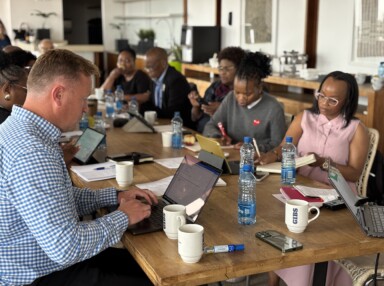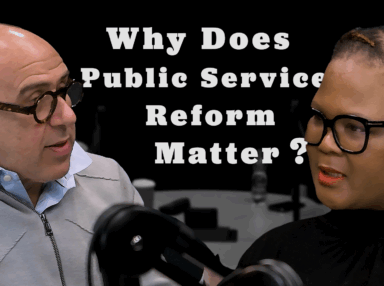Beyond Compliance: The Public Protector’s Compass for an Ethical, Capable Public Service
The Public Service Amendment Bill, Fixing the Fault Lines
For Advocate Kholeka Gcaleka, South Africa’s Public Protector, the Public Service Amendment Bill (PSAB) is not just another piece of legislation − it is a turning point. “Why would you have heads of departments if you are not going to give them their responsibility and hold them accountable?” she asks.
Currently before the National Council of Provinces, the Bill tackles two structural flaws that have long crippled South Africa’s public administration:
Separating politics from administration. Section 36A will prohibit heads of department (HODs) and their deputies from holding political office in a political party. For Gcaleka, this is essential. “How do you manage the political−administrative interface if, after you leave this room, you are equals?” she asks. This reform neutralises conflicted loyalties, ensuring senior officials serve the Constitution, not party hierarchies.
Devolving authority with accountability. For years, ministers have held appointment powers while HODs carried financial responsibility under the PFMA. The Amendment Bill fixes this contradiction by giving HODs authority over human resources and administration. Ministers will set policy and oversee delivery, while directors-general and HODs will run departments day-to-day − and be held accountable for results.
In Gcaleka’s view, these changes are long overdue. They set the foundation for a truly professional, merit-based civil service insulated from patronage. They also align with the National Framework for the Professionalisation of the Public Sector (2022), echoing NSI’s own advocacy for integrity, meritocracy and accountability.
Beyond Law: The Professionalisation Imperative
Laws alone won’t save the public service. Gcaleka is adamant: “Qualifications do not guarantee competence, and competence does not guarantee character.”
Through her investigations, she has seen highly educated officials preside over corruption and maladministration. This is why professionalisation must go deeper than credentials. Recruitment, promotion and deployment should weigh integrity, track record and values alongside skills.
For her, professionalisation is not only an administrative project, it must extend into politics. “You cannot impose professionalisation on the administration if you are not accountable yourself,” she warns. Political parties must vet leaders for competence and character, and citizens must take their voting responsibilities seriously. “If you vote for an individual or party knowing very well they are not capable and corrupt, then why do you think their leadership is going to be different?”
At its core, professionalisation is about cultivating a new culture, one where ethics and service to the Constitution are the compass, rather than personal ambition.
The Character Crisis in Public Service
“If you are not transformed as a person first, how do you transform the next?” Gcaleka asks.
Her investigations reveal what she calls a “scary” reality − too many public servants do the bare minimum, disregard compliance and fail to see their direct role in advancing constitutional values. “They don’t see themselves as advocates of social justice,” she laments.
This character crisis fuels a revolving door of failure; officials implicated in maladministration simply resign, only to be rehired elsewhere. One administrator, she recalls, carried a fraudulent certificate yet continued to secure posts across provinces. To break this cycle, her office has recommended national registers of wrongdoers and stricter reference checks. Without consequences, accountability dissolves.
Yet, she also sees a courageous minority of public servants who uphold integrity even in hostile environments. Many of them face intimidation or worse, but they embody what South Africa’s public service could be: principled, patriotic and professional.
The Ecosystem of Accountability
For Gcaleka, fixing the state requires what she calls an ecosystem approach. The Public Protector’s office is only one node. Working with the Auditor-General, Public Service Commission, Parliament and civil society, she pushes for systemic remedies rather than piecemeal fixes.
This collaboration has yielded results − remedial action implementation has climbed from just 2% in early 2023 to about 50% in 2025, with a target of full compliance. “We look into the people and institutions we investigate as stakeholders,” she explains. “They are part of the ecosystem.”
The same applies to citizens. From petitions to parliamentary engagement, civic pressure ensures oversight doesn’t stall. Reform, she insists, is not the responsibility of officials alone − citizens, too, must hold leaders accountable.
“Being a Public Servant Is a Calling”
Beyond institutional reforms, Gcaleka directs her most passionate words to young public servants on the frontlines.
“Being a public servant is a calling,” she insists. “When you deal with that file, that piece of paper − somebody’s life is written in there.”
Her advice is clear and practical:
- Know your authority. Read the Constitution. Arm yourself with knowledge to resist unlawful instructions.
- Ask the right questions. Silence enables corruption. Questions grounded in law and policy protect integrity.
- Be bold. Integrity often demands quiet courage − saying no even when it is risky.
Above all, she calls for a mindset shift, government work is not just a pay cheque, it is a constitutional duty. This ethos resonates deeply with NSI’s mission to build a more accountable, capable and ethical state.
The Compass for Reform
Advocate Gcaleka’s vision is both sobering and hopeful: Sobering because it exposes deep dysfunction and an entrenched culture of compliance avoidance, weak accountability and blurred political-administrative lines. Hopeful because it points to a path forward: structural reforms like the PSAB, cultural renewal through professionalisation and the daily courage of individuals who see public service as a calling.
As she puts it: “We cannot be the generation creating havoc and not taking responsibility.”
For the New South Institute, her words are a clarion call. They remind us that institutions and laws matter, but, ultimately, it is the character and choices of people − politicians, civil servants and citizens alike − that will determine whether South Africa builds a capable state.



